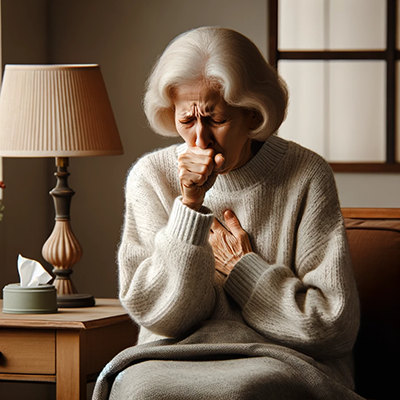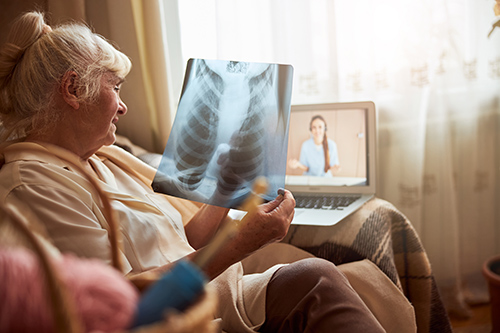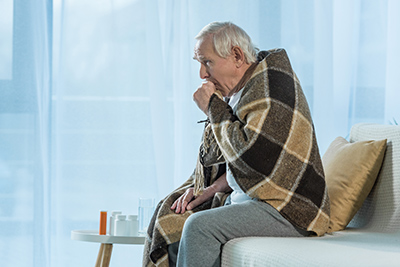Contents

There are quite a few age-related changes that happen in the respiratory system. A few of these changes include a reduced lung capacity, so oxygen intake decreases, how quickly a person can exhale decreases, the respiratory muscles weaken, and the overall lung defense mechanisms decline.
The respiratory system is designed to work endlessly to supply the body with oxygen and dispose of carbon dioxide through breathing. The lungs, other organs, and other tissues comprise the respiratory system to sustain life through a crucial function; to breathe. Breath is the essence of life and the primary part of the respiratory system. Much of this system’s main functionality gradually declines in many older adults.
Due to this decline, respiratory problems and diseases, such as pneumonia, can develop. This poses a higher health risk. Pneumonia, a respiratory infection, affects the lung’s tiny air sacs known as the alveoli. When a person gets pneumonia, the alveoli become inflamed and filled with pus and fluid. This makes breathing difficult and painful and limits the body’s oxygen intake.
Symptoms and Signs of Pneumonia

Pneumonia can happen to anyone, but it can be especially challenging for seniors due to age-related changes in respiratory function. As people age, their immune system also weakens. Some signs and symptoms of pneumonia in seniors include feeling weak, which can make them prone to falling, confusion, and loss of appetite.
Classic pneumonia symptoms can be easier to detect. They include coughing up phlegm, fever and chills, shortness of breath, fatigue, chest pain that worsens when a person coughs or breathes deeply, and rapid breathing.
It is concerning that some of the symptoms of pneumonia in seniors can be subtle yet very serious. Health issues like heart disease and (COPD) chronic obstructive pulmonary disease are more common in seniors. This naturally increases their risk of contracting respiratory conditions such as pneumonia.
Pneumonia Causes in Seniors
Pneumonia is an infection that can be acquired in different ways. The culprits are bacteria, viruses, or fungi. It can be spread by others, even if they show no symptoms, which can be alarming, especially if a senior has a history of contracting pneumonia. It can spread like a cold or flu through coughs, sneezes, or touch.
Pneumonia can be a problem in the 65 and over age group, and they are the people most at risk of getting infected with pneumonia.
Pneumonia Treatment
As we said above, detecting pneumonia in older adults may be especially challenging due to how subtle some symptoms can be. Therefore, it is not wise to self-diagnose! However, your doctor can diagnose by doing a physical examination and taking some tests.

If pneumonia is detected and diagnosed, treating it becomes necessary. If bacteria cause pneumonia, antibiotics are mainly used to fight this condition. Antibiotics prescribed will depend on what type of bacteria has caused the infection. In some cases, home care may be enough. However, quite often, seniors with pneumonia need to be hospitalized.
If a virus causes pneumonia, it cannot be treated with antibiotics. Viral types of pneumonia are treated through supportive care, such as monitoring vital signs, ensuring the patient doesn’t become dehydrated, and helping ease the symptoms. The usual treatments include oxygen therapy, plenty of rest, OTC medications, warm beverages, and adequate fluid intake.
Any senior person can worry about developing a respiratory problem. During the pandemic, many people were concerned that if they contracted COVID-19, their breathing would be affected, leading to severe consequences.
No one can live without breathing. Our respiratory system is one system we would all love to keep in tip-top condition as we age. Our lung capacity is one we want to stay big and strong, and our immune system is functioning well to perform at its best to fight any respiratory disease.
DISCLAIMER: All content on this website is presented solely for educational and informational objectives. Do not rely on the information provided as a replacement for advice, diagnosis, or treatment from a qualified medical expert. If you are pregnant, nursing, or have any preexisting medical concerns, talk to your doctor before using any herbal or natural medicines.
References
- https://www.ncbi.nlm.nih.gov/pmc/articles/PMC4146035
- Bronchiectasis: https://www.lung.org/lung-health-diseases/lung-disease-lookup/bronchiectasis
